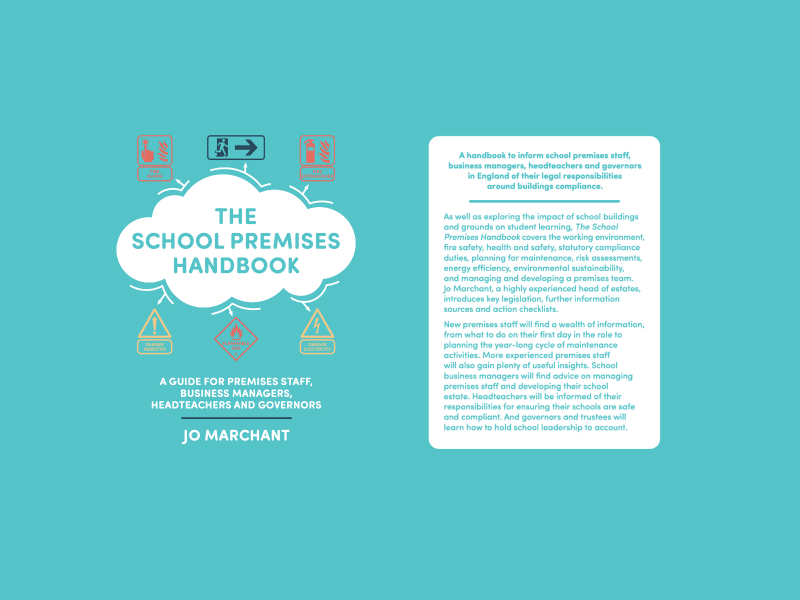"If you haven't got a safe building to teach in, you haven't got a school"

Managing the school estate is a huge project - ranging from fire and gas safety, to dealing with building contractors and more recently driving the sustainability agenda.
… and that’s before you get to the urgent state of repair of many of our school buildings and recent issues with reinforced concrete.

Jo Marchant is head of estates for an 8 school multi-academy trust and decided to write, ‘The School Premises Handbook’ to support premises staff, headteachers, school business managers and governing boards.
It’s a worthwhile read for trust and maintained school boards, especially for those individuals with responsibility for premises or estates. We recently caught up with Jo to find out more.
Jo, how did the book come about?
Well, one of the first things I did when I joined my trust two years ago was to set up a premises staff forum with regular meetings. I do a 20 minute presentation on one aspect of building safety or compliance at each meeting and we’d have a discussion about it with some follow up actions for everyone.
After I’d done a few of these, I thought, ‘someone just needs to write a book with all of the information that my 21 premises staff need in it’ and when I realised I didn’t know anybody who was likely to write that book, I decided to do it myself.
Whilst researching, I realised that there isn't a guide for premises staff out there that encompasses all of the different pieces of legislation you need to adhere to - well, certainly not in one place. There’s a lot of information on the Health and Safety Executive website for instance, but it’s not tailored to school and premises staff who are generally really busy people. They need to know - what do I do for my school? In my context, what do I need to know? So that’s why I wrote the book.
As I was writing it, I was thinking about the role of business managers who’re generally responsible for managing site staff. Also headteachers in smaller schools who have this role. Do they really understand the breadth of what premises staff are required to do? When you become a headteacher, you may not have had much experience of estates management and yet if you don’t know what your responsibilities are it can be quite dangerous in terms of falling foul of legislation.
Then of course there's governors (maintained) and trustees who’re responsible for holding headteachers to account for the health and safety of building occupants. When you look at the skillset of your volunteers - estates management is often the one that’s missing. Generally you’ve got people who know about finance and HR, possibly education - but estates management can be a bit niche. That’s why there’s a chapter on how to hold the school or trust to account. Board members can also look at the rest of the book to understand in more detail what a premises management role involves.
The book helps to demonstrate the breadth of knowledge required to be effective in the role - but it’s also very clear and well laid out.
I wanted to write the book in such a way that if it’s your first job working in school premises or your first time being a governor and you’re suddenly given this responsibility - it makes sense. I didn’t want to use lots of jargon. A lot of people will know a bit about the subject but less about the background to it so I’ve tried to explain the specific area of legislation and compliance for each topic, what’s required and then provide a handy checklist at the end of each chapter.
As governors and trustees you need to know that your buildings are safe and compliant because if you haven’t got a safe building to teach students in, you haven’t got a school! You also need to make sure that school leaders give this area appropriate focus.
We know that lots of schools are not in a great state. Some of our physical buildings need a lot of repair work at the moment. There is a big drive by the DfE to make sure that schools are spending money on building compliance but that’s really challenging for a lot of schools when there isn’t a great deal of money to go around.
As governors and trustees you need to know that your buildings are safe and compliant because if you haven’t got a safe building to teach students in, you haven’t got a school
The school estate is also closely linked to growth, isn’t it?
Yes - growth and changing demographics. You might be about to have a reduction in pupil numbers that impacts premises. For example, if you’re going to take a classroom out of action - say in a primary setting - and you’ve got water in those classrooms, you need to make sure you’re doing regular hygiene checks because there’s a higher possibility of legionella if you’re not running taps and toilets regularly.
Buildings are inextricably linked to the curriculum too.
Yes, it’s about making sure you’re using your buildings to the best effect to deliver the curriculum. I know from my background in special schools that the use of the building changes every year because the cohort changes every year. That’s very specific to the needs of children with special educational needs but it’s also relevant to mainstream settings.
If you’re looking at changing the delivery of the curriculum, you need to consider how your building can contribute to the successful delivery of it. It’s a much broader remit that just - you know - my building is compliant with health and safety legislation.
So for example, if you’re delivering more A level sciences, you’ll need to make sure you’ve got enough labs. You might have a spare classroom you could consider converting - but you’ll need to think about gas and water supply and appropriate desk arrangements. Pupils need a work station where they can see what the teacher’s doing. You’ll need to make sure you’ve got local exhaust ventilation if you’re doing experiments. It’s not just ‘well, we’ll convert this into a science lab’. There’s a lot more that needs to be considered to create a safe working space for pupils.
Similarly food technology rooms. When you’re converting a general classroom into a food tech room, you need to think about the ventilation - that’s really important if you’ve got 14 or 15 ovens going in one room.
The built environment can also make a difference to learning.
Yes and a good example of this is something we’ve done recently at my trust by installing LED lighting. This is obviously a strategic decision to make: an upfront investment with the pay back coming via reduced energy bills.
But having decent lighting really helps learning. One of our buildings is a Victorian infant school and the difference it’s made to how inviting the classroom looks as a learning space is immense, simply because we have improved the light levels.
You also have a chapter on environmental sustainability.
Yes this chapter is a good place to start if you don’t know anything about environmental sustainability. It tells you how to write a sustainability strategy for the built environment - an 8 step plan. It needs to be context specific and depends on the school(s). Plus, school leaders, governors and trustees, along with their stakeholders - need to define what they want from their sustainability strategy.
Finally, in the recently updated Academies Trust Handbook, there is more emphasis on the trust board as the accountable body for estates and working strategically to manage them long term. You’d see that as a good thing I guess?
Definitely as it demonstrates the increasing importance that the DfE place onstudents and staff having a safe learning and working environment. There is some really helpful information available for schools and trusts in the DfE’s Good Estate
Management for Schools suite of documents which includes a top 10 estates checks for boards, so this is a good place to start.
Jo's already sold 1,000 copies of the book since its publication in June 2023.
You can purchase it online at Amazon, Waterstones or the John Catt bookshop.







Post your comment
Comments
Annemarie Gerstenberger 1 Oct 2023, 01:04 (7 months ago)
Really helpful and practical advice.
No one has commented on this page yet.
RSS feed for comments on this page | RSS feed for all comments